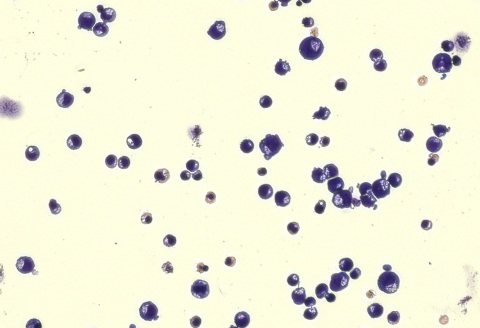Nearly 1.6 billion people worldwide suffer from anemia, and for the first time new research points to how resistance emerges to the drug dexamethasone used to treat the devastating inherited form of anemia known as Diamond Blackfan anemia (DBA). The Feinstein Institutes for Medical Research professor and expert in disorders of the red cell Lionel Blanc, PhD, published his conclusions today in the Journal of Clinical Investigation (JCI).
This press release features multimedia. View the full release here: https://www.businesswire.com/news/home/20200121006031/en/

Image of stained erythroblasts, a nucleated cell in the bone marrow from which red blood cells develop (Credit: The Feinstein Institutes for Medical Research at Northwell Health)
These findings are the first to be published that stem from a five-year, $2.5 million National Institutes of Health (NIH) grant Dr. Blanc received in 2019 to research improved treatment for erythropoietic disorders, including DBA. This rare type of anemia that is caused when bone marrow cannot make enough red blood cells and is typically diagnosed when a child is less than a year old.
Dr. Blanc analyzed the effects of dexamethasone, a corticosteroid used to treat inflammation, on red blood cell formation. The results revealed unique insights, including the identification of dexamethasone targets previously unrecognized in humans that show how it influences the cell cycle and red blood cell formation. The research was done in collaboration with investigators from Stanford University and New York Blood Center.
Because many patients who live with anemia are not responsive or cannot continue glucocorticoid treatment due to adverse side effects, the identification of these molecular targets could lead to the development of new drugs and treatment strategies for DBA and perhaps other forms of anemia.
“Anemia, and specifically Diamond Blackfan anemia, are debilitating conditions. We are encouraged that the insights resulting from this work may lead to more effective therapies to treat these blood disorders,” said Dr. Blanc. “Through our research, we have also opened up new avenues for investigation of how DBA may also be linked to cancer.”
Because other tissues appear to behave in a manner similar to the developing red cell, these may reveal mechanisms relevant to cancer, especially in pediatrics. Thus through the analysis of both normal physiological as well as pathological human blood cell formation, Dr. Blanc hopes to investigate the development of cancer not just in developing blood cells but in broader cell populations.
Dr. Blanc is a recognized leader in hematology research. Before receiving NIH funding, he was awarded a five-year $550,000 career development grant from The St. Baldrick's Foundation, a not-for-profit organization to raise funds to help find cures for children with cancer.
Dr. Blanc was recently named the Les Nelkin Professor of Pediatric Oncology at the Zucker School of Medicine at Hofstra/Northwell.
“Dr. Blanc’s leadership in discovering basic molecular mechanisms of anemia points the way to new therapies," said Kevin J. Tracey, MD, president and CEO of the Feinstein Institutes. "His translational research lays the basis for finding new cures for complex blood disorders.”
About the Feinstein Institutes
The Feinstein Institutes for Medical Research is the research arm of Northwell Health, the largest health care provider and private employer in New York State. Home to 50 research labs, 2,500 clinical research studies and 5,000 researchers and staff, the Feinstein Institutes raises the standard of medical innovation through its five institutes of behavioral science, bioelectronic medicine, cancer, health innovations and outcomes, and molecular medicine. We make breakthroughs in genetics, oncology, brain research, mental health, autoimmunity, and are the global scientific leader in bioelectronic medicine – a new field of science that has the potential to revolutionize medicine. For more information about how we produce knowledge to cure disease, visit feinstein.northwell.edu.
View source version on businesswire.com: https://www.businesswire.com/news/home/20200121006031/en/
Contacts:
516-465-8325
mlibassi@northwell.edu

